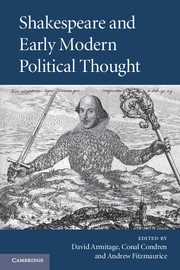Book contents
- Frontmatter
- Contents
- List of contributors
- Acknowledgements
- List of citations and abbreviations
- Introduction
- PART I CONTEXTS
- 1 Shakespeare's properties
- 2 The active and contemplative lives in Shakespeare's plays
- 3 Shakespeare and the ethics of authority
- 4 Shakespeare and the politics of superstition
- PART II THE COURT
- PART III THE COMMONWEALTH
- Afterword: Shakespeare and humanist culture
- Index
4 - Shakespeare and the politics of superstition
Published online by Cambridge University Press: 18 January 2010
- Frontmatter
- Contents
- List of contributors
- Acknowledgements
- List of citations and abbreviations
- Introduction
- PART I CONTEXTS
- 1 Shakespeare's properties
- 2 The active and contemplative lives in Shakespeare's plays
- 3 Shakespeare and the ethics of authority
- 4 Shakespeare and the politics of superstition
- PART II THE COURT
- PART III THE COMMONWEALTH
- Afterword: Shakespeare and humanist culture
- Index
Summary
Shakespeare's interest in the supernatural has caught the attention of generations of literary critics. The ghosts, witches and spirits that populate so many of his plays, together with the omens and prophecies that galvanise his plots, are used to achieve particular dramatic effects and make his audiences think and feel. On stage they can be real, like the ghost of Old Hamlet, or hallucinatory, like the blood on Lady Macbeth's hands; they can work different effects on different characters, embody fantasy and break the bounds of physical possibility. However, as well as drawing on the resources of the spiritual world to enrich the narratives of his plays, Shakespeare also explores early modern debates about the supernatural itself, probing the ambiguities surrounding it and portraying the passions and convictions that it arouses in his contemporaries. As Stephen Greenblatt writes about the witches in Macbeth, ‘Shakespeare is staging the epistemological and ontological dilemmas that in the deeply contradictory ideological situation of this time haunted virtually all attempts to determine the status of witchcraft beliefs and practices. And he is at the same time and by the same means staging the insistent, unresolved questions that haunt the practice of the theatre.’
Witchcraft is one of several arenas in which Shakespeare opens out the contested meanings attaching to the boundary between the natural and supernatural. Another is superstition. Running through several of his plays is an interest in the power of the imagination to nurture a passion of superstitious fear, which can in turn generate psychological and political crises.
- Type
- Chapter
- Information
- Shakespeare and Early Modern Political Thought , pp. 80 - 98Publisher: Cambridge University PressPrint publication year: 2009
- 17
- Cited by

